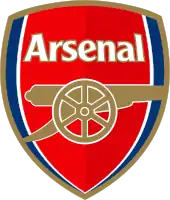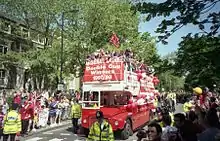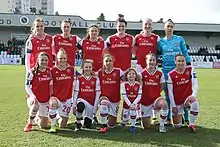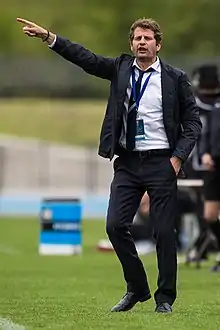Arsenal W.F.C.
Arsenal Women Football Club, commonly referred to as Arsenal,[1][2] is an English professional women's football club based in Islington, London, England. The club plays in the Women's Super League, the top tier of English women's football.
 | ||||
| Full name | Arsenal Women Football Club | |||
|---|---|---|---|---|
| Nickname(s) | The Gunners | |||
| Founded | 1987 as Arsenal Ladies | |||
| Ground | Meadow Park | |||
| Capacity | 4,500 (1,700 seated) | |||
| Owner | Kroenke Sports & Entertainment | |||
| Head coach | Jonas Eidevall | |||
| League | Women's Super League | |||
| 2021–22 | FA WSL, 2nd of 12 | |||
| Website | Club website | |||
| ||||
| Departments of Arsenal | ||||
|---|---|---|---|---|
|
||||
|
Arsenal were founded in 1987 following an initiative by Vic Akers, who became the club's first, longest-serving, and most successful manager. He guided Arsenal to continued success until his departure in 2009, winning the most top-flight matches in English football history. The club have sustained this record,[3] and have won the most doubles and trebles in English football history. Arsenal have also completed a record seven unbeaten league seasons, setting a number of English records for longest top-flight unbeaten run, for goals scored, and points won.[4][5]
Arsenal are statistically the most successful club in English women's football, holding the records for most titles won in each domestic competition they have played in. The club have won 15 league titles, 14 Women's FA Cups, 5 Women's League Cups, 10 Women's National League Cups, 5 Women's FA Community Shields, and are the only English club to win the UEFA Women's Champions League. They are also the only English club to win the continental treble while going undefeated in all competitions played that same season. In the 2006–07 season, the club became the first in the history of women's football to achieve the continental European sextuple.[6]
Arsenal plays its home games at Meadow Park in Borehamwood, and occasionally at the Emirates Stadium.[7]
History
1987–2009: Founding and early success

In 1987, long-term Arsenal men's team kit manager Vic Akers helped found a women's football club, and was appointed as their initial manager. The club began operating as Arsenal Ladies Football Club.[8] Due to the status of women's football in England suffering from an overall decline in interest, Arsenal were limited to sparse, nomadic cup appearances for the first four years of their existence, and did not turn professional until 2002.[9][10] They won their first major honour, the Women's League Cup, in the 1991–92 season. Also in 1992, they won promotion to the FA Women's Premier League from the FA Women's National League South, and a season later, won the top division title at the first time of asking.[11]
This began a period of sustained dominance for the club, who soon permanently moved into Meadow Park in Borehamwood, Hertfordshire, in a groundshare agreement with non-league side Boreham Wood. Following the storied successes of the men's team, Arsenal made a conscious effort to brand women's football as equitable. Over the next twenty years, Arsenal approached all facets of the game, such as training, tactics, scouting, and finance, with the goal to maximize the growth of the club and attain trophies. Throughout the 1990s and 2000s, Arsenal lavished atop the Premier League for many seasons, boasting academy graduates like Marieanne Spacey and Faye White, as well as utilizing the club's income on stars like Emma Byrne, to allow the club to win a slew of trophies.[12]
Under Akers' stewardship, Arsenal enjoyed unilateral domestic success, as the club claimed 11 league titles, nine FA Women's Cup titles, ten FA Women's Premier League Cup titles, and five FA Women's Community Shield wins. This included seven straight league wins from the 2003–04 season to 2008–09 season, as well as six unbeaten campaigns.[13][14] Moreover, Akers lead the team to the most successful club season in English women's football in the 2006–07 season, as the team won every single competition available to them, including the ever elusive UEFA Women's Cup. The win marked Arsenal's only trophy won from European competition, and the first time an English club won the competition.[15][16] This unique sextuple was recognized with The Committee Award by the Sports Journalists' Association in the 2007 Sports Journalists' Awards.[17]
Akers also led the team to a number of English women's football records, including a six-year league unbeaten run from October 2003[18] to March 2009, marking 108 games without defeat. During that spell, Arsenal won a record 51 league games in a row, between November 2005 and April 2008.[8] Akers retired from management following a domestic treble in the 2008–09 season.
2009–present: Post-Akers and the WSL
.jpg.webp)
Akers was succeeded by Tony Gervaise,[19] who resigned in February 2010 after only eight months in charge, suggesting his position had been undermined by outside interference.[19] In an unusual development, reserve coach Laura Harvey became first-team manager and Gervaise became reserve coach.[20] This appointment marked the club's first female coach in any capacity.
After a year break in play in preparation for a reformatted league, Arsenal were named as founder members of the FA Women's Super League, which commenced in the spring of 2011.[21] Arsenal won the inaugural season, marking their eighth consecutive English title, and secured another domestic double by also winning the FA Cup.[22] After a two-year period without a league triumph, Shelley Kerr was announced as Harvey's successor in 2013. Under her management, the club won two FA Women's Cups, including a win in 2014, two weeks after the men's team won the 2014 FA Cup, completing a rare FA Cup double for the club. But after a poor run of form which saw Arsenal gain only one point from the opening four league matches of the 2014 season, including exits from the Champions League to minnows Birmingham and a shock lose to Reading, Kerr resigned.[23] She was replaced by Pedro Losa.[24] Losa led the team to the 2015 FA WSL Cup[25] and the 2016 FA Women's Cup.[26] Moreover, he helped the squad rebuild, notably recruiting younger stars like Daniëlle van de Donk, Kim Little, Beth Mead and Vivianne Miedema. Losa also brought through youngsters like Leah Williamson. However, following the season's end, Losa resigned, and was replaced by Joe Montemurro.
In July 2017, the club rebranded as Arsenal Women Football Club,[2][11] in a move described by Arsenal as "clear signal of togetherness and unity", and to retain the progressive ethos of the club.[1] Utilizing the core Losa helped build, Montemurro led Arsenal to the 2018–19 Women's Super League title, with a game to spare. The win marked their first title in seven years, and marked the club's return to the Champions League for the first time in five years. Montemurro left the club at the end of the 2020–21 season.[27]
Following the resignation of Montemurro, the club appointed Jonas Eidevall as head coach of Arsenal.[27] On 24 September 2022, the North London derby at the Emirates Stadium recorded an attendance figure of 47,367, the highest ever for a WSL match.[28]
Kits
Stadium
Arsenal Women play most of their home matches at Meadow Park, home of Vanarama National League side Boreham Wood, in Borehamwood, Hertfordshire. It has a capacity of 4,500, although attendances for most league matches are around 1,000. Arsenal's home UEFA Women's Champions League matches are also played here. However, due to the connection with Arsenal F.C., they are permitted to play in the Emirates Stadium on occasions.[7]
Players
First-team squad

- As of 14 September 2022[10]
Note: Flags indicate national team as defined under FIFA eligibility rules. Players may hold more than one non-FIFA nationality.
|
|
Out on loan
Note: Flags indicate national team as defined under FIFA eligibility rules. Players may hold more than one non-FIFA nationality.
|
Academy
Arsenal also operate a reserve team, which is mainly formed from Academy players. The reserves have won four FA Women's Premier Reserve League titles and five FA Women's Premier Reserve League Cups in their history.
Former players
For notable current and former players, see Category:Arsenal W.F.C. players.
Management and staff
Current staff

As of 24 July 2022[33]
Hall of Fame
The following Arsenal players have been inducted into the Women's Super League Hall of Fame.
Notes:
- Players who have spent the majority or the entirety of their career at Arsenal are listed in bold.
| Women's Super League Hall of Fame | |||||
|---|---|---|---|---|---|
| Player | Pos. | Years | Inducted | ||
| MF | 2016–2017 | 2021 | |||
| FW | 2011–2016 | 2021 | |||
| FW | 2012–2017 | 2021 | |||
Last updated: 21 August 2022.
Source: List of Women's Super League Hall of Fame Inductees
Honours
Seasons in bold are seasons when the club won a double of the league and FA Cup.
- As of 12 December 2019[34]
League
- FA Women's Premier League National Division / FA Women's Super League (Level 1)
- Winners (15) (record): 1992–93, 1994–95, 1996–97, 2000–01, 2001–02, 2003–04, 2004–05, 2005–06, 2006–07, 2007–08, 2008–09, 2009–10, 2011, 2012, 2018–19
- FA Women's Premier League Southern Division (Level 2)
- Winners (1): 1991–92
Cups
- FA Women's Cup
- Winners (14) (record): 1992–93, 1994–95, 1997–98, 1998–99, 2000–01, 2003–04, 2005–06, 2006–07, 2007–08, 2008–09, 2010–11, 2012–13, 2013–14, 2015–16
- FA WSL Cup / FA Women's League Cup
- Winners (5) (record): 2011, 2012, 2013, 2015, 2017–18
- FA Women's Premier League Cup
- Winners (10) (record): 1991–92, 1992–93, 1993–94, 1997–98, 1998–99, 1999–00, 2000–01, 2004–05, 2006–07, 2008–09
- FA Women's Community Shield
- Winners (5) (record): 2000 (shared), 2001, 2005, 2006, 2008
European
- UEFA Women's Champions League
- Winners (1): 2006–07
County
- London County FA Women's Cup
- Winners (10) (record): 1994–95, 1995–96, 1996–97, 1999–00, 2003–04, 2006–07, 2007–08, 2008–09, 2009–10, 2010–11
UEFA club coefficient ranking
In European football, the UEFA coefficients are statistics used for ranking and seeding teams in club and international competitions. Club coefficients are used to rank individual clubs for seeding in the UEFA Women's Champions League.
- As of 24 October 2022[35]
| Rank | Team | Points |
|---|---|---|
| 6 | 65.633 | |
| 7 | 43.633 | |
| 8 | 42.633 | |
| 9 | 40.433 | |
| 10 | 36.899 |
See also
- List of women's association football clubs in England and Wales
- Women's football in England
- List of women's association football clubs
References
- "Important update from our women's team". Arsenal Media. 28 July 2017. Retrieved 28 July 2017.
- "Women's Super League One : Arsenal drop 'Ladies' from name". BBC Sport. 28 July 2017. Retrieved 29 July 2017.
- "Arsenal WFC – Records and Statistics". worldfootball.net. Retrieved 10 June 2019.
- "Arsenal Women – History". Arsenal F.C. Retrieved 10 June 2019.
- "England – Arsenal WFC". Soccerway. Retrieved 10 June 2019.
- Miller, Nick (25 December 2017). "Barcelona, Arsenal Ladies lead teams with single-season trophy hauls". ESPN. Retrieved 16 August 2022.
- "Emirates Stadium to host more AWFC matches". Arsenal Media. 19 May 2022. Retrieved 21 July 2022.
- Kessel, Anna (4 May 2008). "The invincibles". The Guardian. London. Retrieved 25 April 2010.
- Tony Leighton (15 May 2002). "Banks stays with semi-pro Gunners". BBC Sport. Retrieved 28 December 2010.
- "Players". Arsenal F.C. Retrieved 27 July 2021.
- Trehan, Dev (28 July 2017). "Arsenal Ladies renamed Arsenal Women". Sky Sports. Retrieved 29 July 2017.
- "Arsenal and its Greatest Women of All Time". DailyCannon. Retrieved 10 June 2019.
- "Arsenal Ladies Honours". Arsenal F.C. Archived from the original on 12 August 2008. Retrieved 21 May 2007.
- "Arsenal Ladies 4–1 Chelsea". Arsenal F.C. 28 April 2008. Retrieved 6 May 2008.
- Tony Leighton (29 April 2007). "Arsenal boss hails Uefa Cup win". BBC Sport. Retrieved 6 May 2007.
- "FA Women's Premier League". The FA. Archived from the original on 29 September 2015. Retrieved 28 September 2007.
- "Sports Journalists' Awards 2007". sportsjournalists.co.uk. Archived from the original on 5 December 2007. Retrieved 6 February 2008.
- "Ladies complete unbeaten League century". Arsenal F.C. Archived from the original on 5 March 2016. Retrieved 1 April 2018.
- Tony Leighton (20 February 2010). "Arsenal Ladies boss Tony Gervaise reveals reasons behind shock exit". BBC. Retrieved 26 February 2011.
- "Laura Harvey becomes Arsenal Ladies manager". Arsenal F.C. 11 February 2010. Archived from the original on 14 February 2010. Retrieved 11 February 2010.
- "Lincoln Ladies FA Women's Super League bid success". BBC. 22 March 2010. Archived from the original on 28 March 2010. Retrieved 2 April 2010.
- "Arsenal take English WSL title". UEFA. 28 August 2011. Retrieved 29 August 2011.
- Arsenal miss Champions League next season Archived 20 October 2013 at the Wayback Machine fitaa.com. 18 September 2013. Retrieved 19 October 2013.
- "Arsenal Ladies: Pedro Martinez Losa appointed new manager". BBC Sport. 29 August 2014. Retrieved 2 May 2017.
- "Continental Cup final: Arsenal Ladies 3–0 Notts County Ladies". BBC Sport. 1 November 2015. Retrieved 2 May 2017.
- "Women's FA Cup final: Arsenal Ladies 1–0 Chelsea Ladies". BBC Sport. 14 May 2016. Retrieved 2 May 2017.
- Westwood, James (28 June 2021). "Arsenal Women appoint Eidevall to succeed Montemurro as new head coach". Goal. Retrieved 25 September 2022.
- Imber, Leon (24 September 2022). "Arsenal-Tottenham derby smashes WSL attendance record". ESPN. Retrieved 25 September 2022.
- "Emirates and Arsenal Renew Sponsorship Deal". The Emirates Group. Retrieved 2 October 2021.
- "PUMA and Arsenal announce partnership". Arsenal Football Club. Retrieved 2 October 2021.
- "Arsenal partner with 'Visit Rwanda'". Arsenal Football Club. Retrieved 2 October 2021.
- "adidas and Arsenal launch new home kit". Arsenal Football Club. Retrieved 2 October 2021.
- "Arsenal Women History". Arsenal.com. Retrieved 24 July 2022.
- "Honours". Arsenal F.C.
- "Member associations – UEFA Coefficients – Club coefficients". UEFA.
Sources
- Donlevy, Michael (24 September 2022). "The birth of Arsenal Women". Arsenal F.C. Retrieved 4 October 2022.